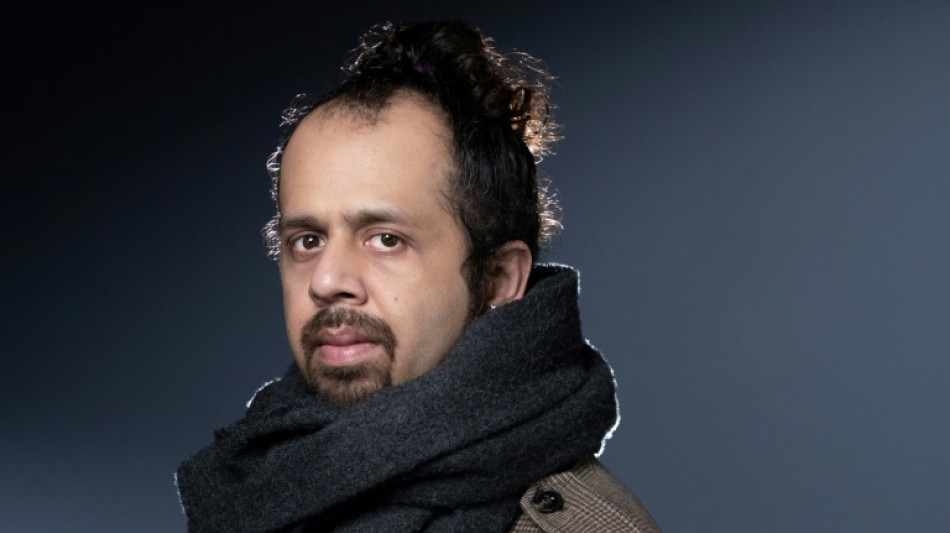
-
 Microsoft raises Xbox prices globally, following Sony
Microsoft raises Xbox prices globally, following Sony
-
US stocks rise on Meta, Microsoft ahead of key labor data

-
 Toulouse injuries mount as Ramos doubtful for Champions Cup semi
Toulouse injuries mount as Ramos doubtful for Champions Cup semi
-
Guardiola glad of Rodri return but uncertain if he'll play in FA Cup final

-
 Ruud sails past Medvedev into Madrid Open semis
Ruud sails past Medvedev into Madrid Open semis
-
'Not a commodity': UN staff rally over deep cuts
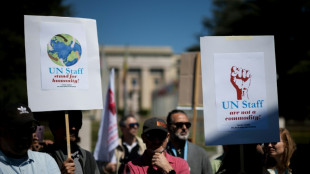
-
 Flintoff proud as Afghan refugee protege plays for Lancashire second team
Flintoff proud as Afghan refugee protege plays for Lancashire second team
-
Peruvian cardinal accused of abuse challenges late pope's sanction

-
 Trans women barred from women's football by English, Scottish FAs
Trans women barred from women's football by English, Scottish FAs
-
Oil prices drop, stocks diverge amid economic growth fears

-
 Israel brings fire near Jerusalem 'under control', reopens roads
Israel brings fire near Jerusalem 'under control', reopens roads
-
Lopetegui appointed coach of Qatar

-
 UK counter-terrorism unit probes rappers Kneecap but music stars back band
UK counter-terrorism unit probes rappers Kneecap but music stars back band
-
Yamal heroics preserve Barca Champions League final dream

-
 2026 T20 World Cup 'biggest women's cricket event in England' - ECB
2026 T20 World Cup 'biggest women's cricket event in England' - ECB
-
Bangladesh begins three days of mass political rallies

-
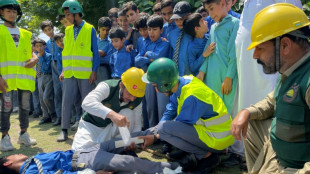 Children learn emergency drills as Kashmir tensions rise
Children learn emergency drills as Kashmir tensions rise
-
Millions of children to suffer from Trump aid cuts
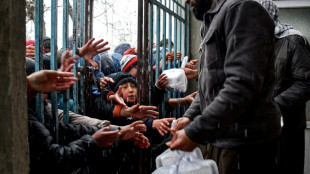
-
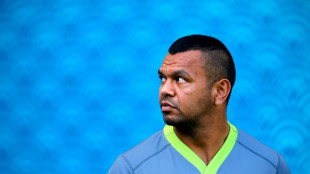 Veteran Wallaby Beale set for long-awaited injury return
Veteran Wallaby Beale set for long-awaited injury return
-
Syria's Druze take up arms to defend their town against Islamists

-
 Tesla sales plunge further in France, down 59% in April
Tesla sales plunge further in France, down 59% in April
-
US calls on India and Pakistan to 'de-escalate'

-
 Israel reopens key roads as firefighters battle blaze
Israel reopens key roads as firefighters battle blaze
-
Europe far-right surge masks divisions

-
 James will mull NBA future after Lakers playoff exit
James will mull NBA future after Lakers playoff exit
-
Ukraine's chief rabbi sings plea to Trump to side with Kyiv

-
 Australian mushroom meal victim 'hunched' in pain, court hears
Australian mushroom meal victim 'hunched' in pain, court hears
-
Lakers dumped out of playoffs by Wolves, Rockets rout Warriors

-
 Booming tourism and climate change threaten Albania's coast
Booming tourism and climate change threaten Albania's coast
-
US reaching out to China for tariff talks: Beijing state media

-
 Tariffs prompt Bank of Japan to lower growth forecasts
Tariffs prompt Bank of Japan to lower growth forecasts
-
Kiss faces little time to set Wallabies on path to home World Cup glory

-
 Serbian students, unions join forces for anti-corruption protest
Serbian students, unions join forces for anti-corruption protest
-
Slow and easily beaten -- Messi's Miami project risks global embarrassment

-
 Fan in hospital after falling to field at Pirates game
Fan in hospital after falling to field at Pirates game
-
Nuclear power sparks Australian election battle

-
 Tokyo stocks rise as BoJ holds rates steady
Tokyo stocks rise as BoJ holds rates steady
-
Bank of Japan holds rates, lowers growth forecasts

-
 'Sleeping giants' Bordeaux-Begles awaken before Champions Cup semis
'Sleeping giants' Bordeaux-Begles awaken before Champions Cup semis
-
Napoli eye Scudetto as Inter hope for post-Barca bounce-back

-
 Germany's 'absolutely insane' second tier rivalling Europe's best
Germany's 'absolutely insane' second tier rivalling Europe's best
-
PSG minds on Arsenal return as French clubs scrap for Champions League places

-
 UK WWII veteran remembers joy of war's end, 80 years on
UK WWII veteran remembers joy of war's end, 80 years on
-
Myanmar junta lets post-quake truce expire

-
 Rockets romp past Warriors to extend NBA playoff series
Rockets romp past Warriors to extend NBA playoff series
-
Messi, Inter Miami CONCACAF Cup dream over as Vancouver advance

-
 UN body warns over Trump's deep-sea mining order
UN body warns over Trump's deep-sea mining order
-
UK local elections test big two parties

-
 US judge says Apple defied order in App Store case
US judge says Apple defied order in App Store case
-
Seventeen years later, Brood XIV cicadas emerge in US


From Pakistani 'kill list' to comic book author
He barely escaped Pakistan with his life after angering its powerful military with his journalism. Now his story has become a comic book.
Taha Siddiqui's therapist told him not to dwell on the attempted kidnapping he suffered five years ago, or he would never escape his trauma.
"Clearly, I didn't listen to her at all," said Siddiqui with a smile.
He was speaking to AFP in his Paris bar, The Dissident Club, which he opened in 2020 as a refuge for exiles like himself.
It shares its name with his new autobiographical comic book -- co-authored with cartoonist Hubert Maury who was previously a French diplomat in Pakistan -- which is released on Wednesday in France and soon in other languages.
It opens with the moment in January 2018 when members of Pakistan's military pulled him from a taxi in broad daylight and shoved him into another car. Detention, torture and death were very real possibilities.
Two strokes of luck saved Siddiqui -- convincing the man holding his neck to release him, saying he would go quietly, and noticing that the passenger door was unlocked.
He leapt from the moving car, ran down the busy highway and managed to alert his media friends, swiftly organising a press conference about the attack in order to buy time.
Only after escaping to Paris did he discover he was on the military's "kill list" and could never return.
- The road to atheism -
The graphic novel goes beyond this incident to explain the spread of extremism and war in the region through the story of his religiously conservative upbringing in Saudi Arabia and Pakistan.
"I chose to tell my story as a comic book because I couldn't have any when I was young," said Siddiqui.
"It will definitely piss off my father. I hope he won't see it."
Not that they have a good relationship. His father's response to the attempted kidnapping was to say he was being punished by God for not praying enough.
It was a classic Romeo-and-Juliet experience that challenged Siddiqui's own faith, after his family opposed his marriage to a Shia girl he met at university. The divide between the Sunni and Shia branches of Islam is a fraught and often violent faultline in Pakistan.
"That really triggered this thing in me that there's something wrong with the way we live," said Siddiqui, who is now a full-blown atheist.
- 'No regrets' -
The attempted kidnapping put an end to a successful career. He had worked with many international media and won the prestigious Albert Londres prize for a piece on the Taliban banning polio vaccines.
His fearless criticism of the powerful Pakistani military made him a target, particularly a front-page story for the New York Times exposing their secret prisons.
"It was pretty crazy," said Maury, his co-author. "But that's what makes it such an interesting story.
"I find it impressive and remarkable. He risked not just his life but exile as well and cutting ties with his family."
Siddiqui said he has no regrets: "I chose this life but I didn't choose (the military's) reaction. That's on them, not me.
"Sometimes I'm sad. I really believed in the country at one time in my life but now less and less. Pakistan is a very dysfunctional country."
Siddiqui is already planning a follow-up that looks at the lives of other exiles.
"I wanted to take control because when I was attacked I lost control," he said.
Even his therapist is convinced, having recently visited the bar for a talk on exile and mental health.
"She said I was doing well and getting purpose out of what happened to me," he said. "I was really happy."
D.Kaufman--AMWN